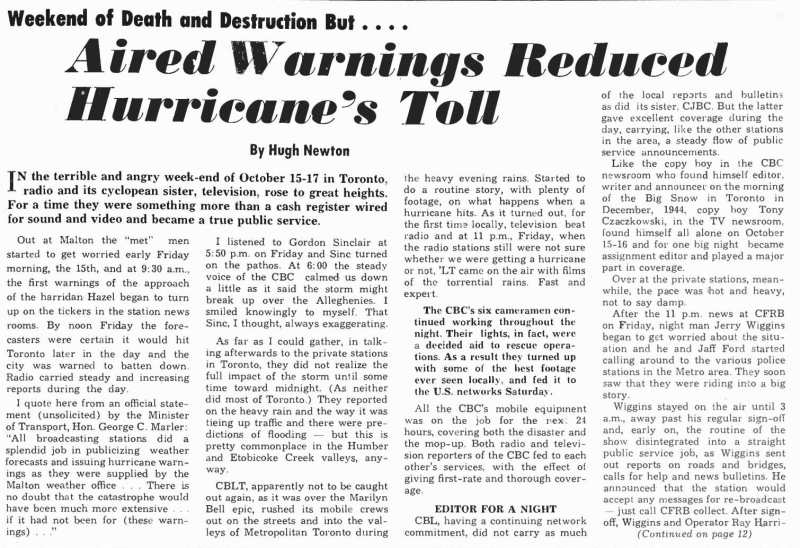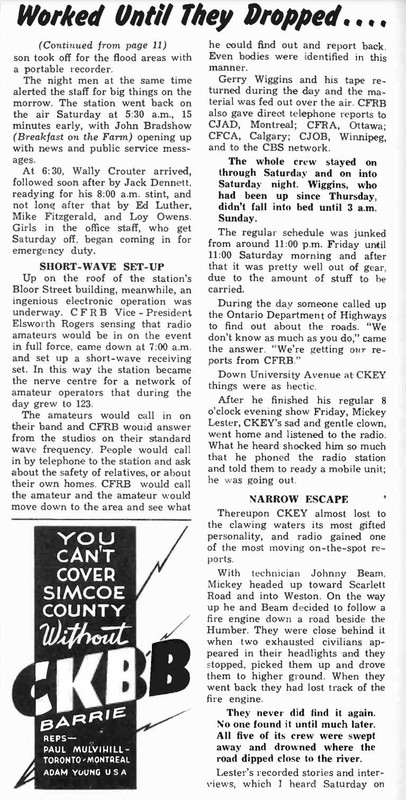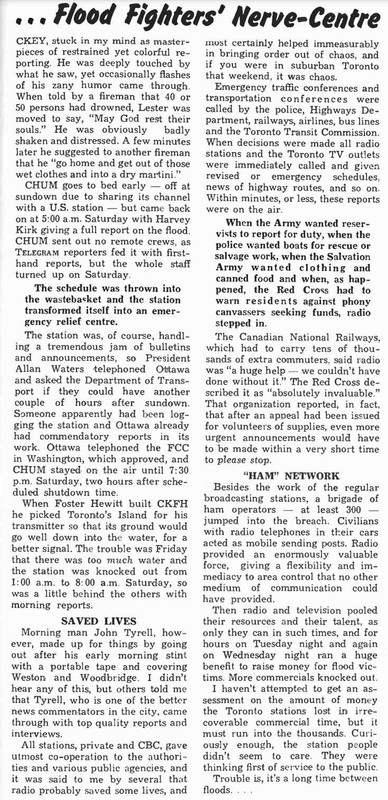- RadioActive
- Moderator
 Offline
Offline
The Terrible Night Local Radio Came To T.O's Rescue During A Disaster
If you’ve ever forgotten how important radio once was (and still can be) check out this story. It’s the amazing history of how local stations responded back on October 15, 1954, when one of the worst storms to ever hit the city blew into Toronto with full force.
It was Hurricane Hazel and while many of us weren’t around then, the effects of that monster storm still echo here today, after it destroyed an entire street, Raymond Drive in Etobicoke, killing 30 people of the 81 total who perished. That area of the city was never rebuilt and became a flood plain to avoid future disasters.
But in those days of no Internet, rotary dial phones and barely any TV, it was radio that came to the rescue. The article below is simply amazing in some of the stories it tells about what happened that night. It was late on a Friday, and most of the regulars had long gone home for the weekend. But as the scope of the disaster spread, many came back, including CFRB’s Wally Crouter and Jack Dennett.
With many phones and power both out, 'RB set up a ham station inside its studios so that amateur radio operators could report live on its airwaves about the damage and need in their areas.
CHUM, which was a daytime only station back then and a few years from its rock and roll glory days, phoned Ottawa to get permission to stay on late and then sign back on early, despite the interference to stations in the U.S. They were told they could, likely the first time that was ever allowed.
But it was CKEY that had perhaps the most incredible story. When morning man Mickey Lester heard what was happening in the city, he came back in and took a remote vehicle out with a technician, deciding to follow a Toronto Fire Department truck as it headed into the brunt of the storm.
At one point, two exhausted residents, driven out by the flood, flagged them down and they took the strangers to higher ground. They went back to look for the firetruck but couldn’t find it. It was only later that they learned the truck and all five onboard it had been swept away by the raging waters. Had they not stopped to help the couple, it’s likely they would have died, too.
Things have changed since that day, of course. But when all else fails, a battery-operated radio can still be a life saver. And back then, it was local radio that literally came to the rescue for a submerged and partially destroyed city.
I can only imagine what might happen today, given all the cuts at Bell. I’m just happy they didn’t own any stations back then.


- Saul
- Member
 Offline
Offline
Re: The Terrible Night Local Radio Came To T.O's Rescue During A Disaster
Wasn't there a Mickey Lester who had an ask the doctor type of show on CFRB. I believe he was a pediatrician... Wonder if he and the morning man referenced above are (were) one and the same...
- RadioActive
- Moderator
 Offline
Offline
Re: The Terrible Night Local Radio Came To T.O's Rescue During A Disaster
Nope. Totally different people.
That's the radio version outside the old CKEY studios (Pic from City of Toronto Archives.)
- •
- Shorty Wave
- Member
 Offline
Offline
Re: The Terrible Night Local Radio Came To T.O's Rescue During A Disaster
RadioActive wrote:
Nope. Totally different people.
That's the radio version outside the old CKEY studios (Pic from City of Toronto Archives.)
What a great photo, looks a bit like a younger Dan Aykroyd!
- RadioActive
- Moderator
 Offline
Offline
Re: The Terrible Night Local Radio Came To T.O's Rescue During A Disaster
In May 2020, SOWNY member and radio veteran John Donabie paid tribute to the other Mickey Lester, the physician who appeared regularly on his CFRB weekend show and who passed away that month. If I'm not mistaken, they somehow got hold of the old CKEY jingle and used it to introduce the other Mickey Lester as part of the weekly segment.
Donabie Laments Dr. Mickey Lester's Passing
- •
- BowmanvilleBob
- Member
 Offline
Offline
Re: The Terrible Night Local Radio Came To T.O's Rescue During A Disaster
Radio has, in general, an excellent track record of stepping up to the plate to provide service in the public interest during natural or manmade disasters. Local radio played a big role in keeping people informed during last year's forest fires in northern Alberta and the NWT.
But there have been times in the past where local radio has dropped the ball. A few examples:
- Several years ago, the mayor of Fort Nelson, B.C. was joined by several officials as they broke into the local radio station to broadcast alerts about an ongoing local emergency. The station, which had no staff and only a small studio with a mic and turntable, was a repeater of a larger outlet that was broadcasting canned music at the time. The mayor defended the action, stating they had tried to reach the larger market station but no one picked up the phone.
- In 2003, Halifax was hit by Hurricane Juan, at that time the largest hurricane that had ever hit Atlantic Canada. Environment Canada officials expressed their frustration at calling many local radio stations on the evening the storm hit, only to find no one on the air to broadcast weather warnings. The storm caused almost $200 million in damages and lead to the establishment of new weather alert systems in Nova Scotia.
- In 1998, a massive ice storm knocked CJAD Montreal off the air for several days and left the city at a standstill. Although CJFM was still on the air, management opted to continue playing soft rock hits with an occasional newscast, rather than going into full, all-news storm coverage. Veteran newsman Jim Duff was so angry that he handed in his resignation.
Radio can still be an important part of any emergency response situation, but it only works if a station's management is prepared to sacrifice some short-term profit for the public good.
Last edited by BowmanvilleBob (March 20, 2024 1:13 pm)
- newsguy1
- Member
 Offline
Offline
Re: The Terrible Night Local Radio Came To T.O's Rescue During A Disaster
Remember this?
Shortly after 4 p.m. ET on [color=#040c28]Aug. 14, 2003, more than 50 million North Americans found themselves without power. Toronto — along with number of cities including New York, Cleveland and Ottawa — came to a standstill as traffic lights, office buildings, subways and airports shut down.
My small short wave radio kept me informed in my darkened livingroom, lit by candles.
I heard that the blackout was not terrorism, and I heard reports as the power began to come back bit by bit. It was a great help.[/color]
Last edited by newsguy1 (March 20, 2024 1:18 pm)
- RadioActive
- Moderator
 Offline
Offline
Re: The Terrible Night Local Radio Came To T.O's Rescue During A Disaster
BowmanvilleBob wrote:
Radio has, in general, an excellent track record of stepping up to the plate to provide service in the public interest during natural or manmade disasters. Local radio played a big role in keeping people informed during last year's forest fires in northern Alberta and the NWT.
But there have been times in the past where local radio has dropped the ball. A few examples:
- Several years ago, the mayor of Fort Nelson, B.C. was joined by several officials as they broke into the local radio station to broadcast alerts about an ongoing local emergency. The station, which had no staff and only a small studio with a mic and turntable, was a repeater of a larger outlet that was broadcasting canned music at the time. The mayor defended the action, stating they had tried to reach the larger market station but no one picked up the phone.
- In 2003, Halifax was hit by Hurricane Juan, at that time the largest hurricane that had ever hit Atlantic Canada. Environment Canada officials expressed their frustration at calling many local radio stations on the evening the storm hit, only to find no one on the air to broadcast weather warnings. The storm caused almost $200 million in damages and lead to the establishment of new weather alert systems in Nova Scotia.
- In 1998, a massive ice storm knocked CJAD Montreal off the air for several days and left the city at a standstill. Although CJFM was still on the air, management opted to continue playing soft rock hits with an occasional newscast, rather than going into full, all-news storm coverage. Veteran newsman Jim Duff was so angry that he handed in his resignation.
Radio can still be an important part of any emergency response situation, but it only works if a station's management is prepared to sacrifice some short-term profit for the public good.
laffin wrote:
Have listened since the early Wally Crouter days and have tried to tolerate its Bell influence but alas, no more.
The once mighty 1010 is nothing but a shell of its former self lacking continuity and stability. Moved the dial a month ago to FM.
These two responses are proof of what happened between then and now. Radio was always a business. They used to call it a "licence to print money." But back in the days of the Hurricane Hazel nightmare, there was also a sense of public service. Yes, you wanted a big profit. But that came with a duty to serve people in exchange for the privilege of using the scarce public airwaves.
With companies like Bell (and to a lesser extent Rogers, which at least has radio in its very founding) those responsibilities have gone out the window. They seem to see it as a cash cow only and once the milk runs out, it's time to butcher it and profit off what you can get from the carcass, before getting out of the game entirely.
I can only wonder if a disaster like the hurricane happened today - on a Friday night and a weekend, no less - how these empty newsrooms and pre-recorded voice tracking shows would handle the emergency.
That's one of the big differences, I suppose, between then and now.
Even with all the technological breakthroughs, it can certainly be argued that in an emergency, it was much better then.
- •
- BowmanvilleBob
- Member
 Offline
Offline
Re: The Terrible Night Local Radio Came To T.O's Rescue During A Disaster
Some fallout from two of the examples I mentioned in my initial posting:
- Some of the senior executives in the now-defunct broadcasting chain that owned the Fort Nelson station were incensed by the mayor's actions and wanted charges of break and enter and trespassing to be laid. Thankfully cooler heads prevailed. The chain eventually brought in a salesperson/part-time on-air jock to provide cut-ins to the network morning show in case a similar incident occurred in the future.
- Local TV in Halifax and even some national outlets picked up on the lack of on-air radio staff in the lead-up to the hurricane and did stories about it. One local broadcasting executive insisted there was nothing wrong with taking syndicated on-air programming in the evening hours because "it's what the people want." In true poetic justice, this exec got canned several months later in a cost-cutting move.
 1 of 1
1 of 1